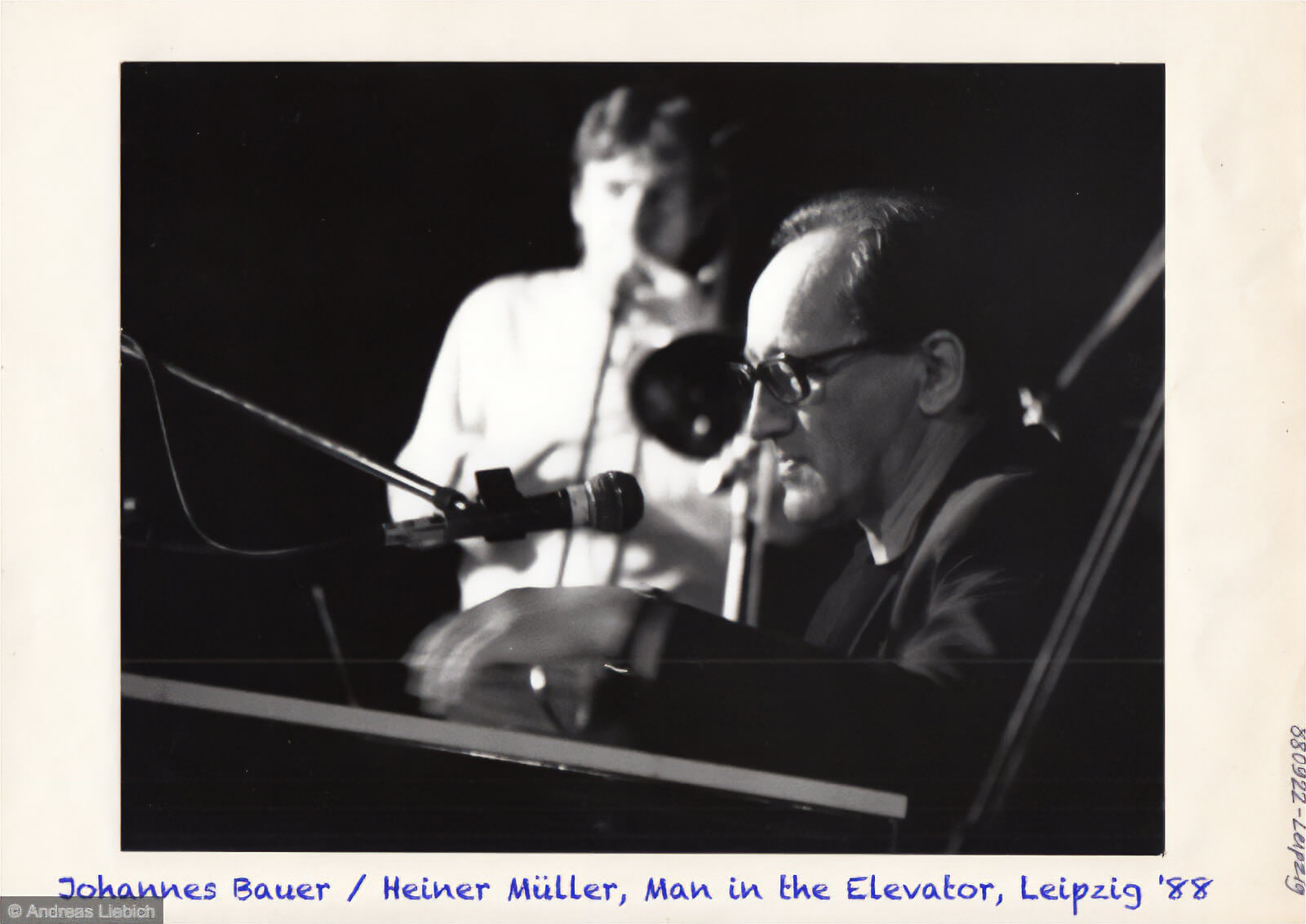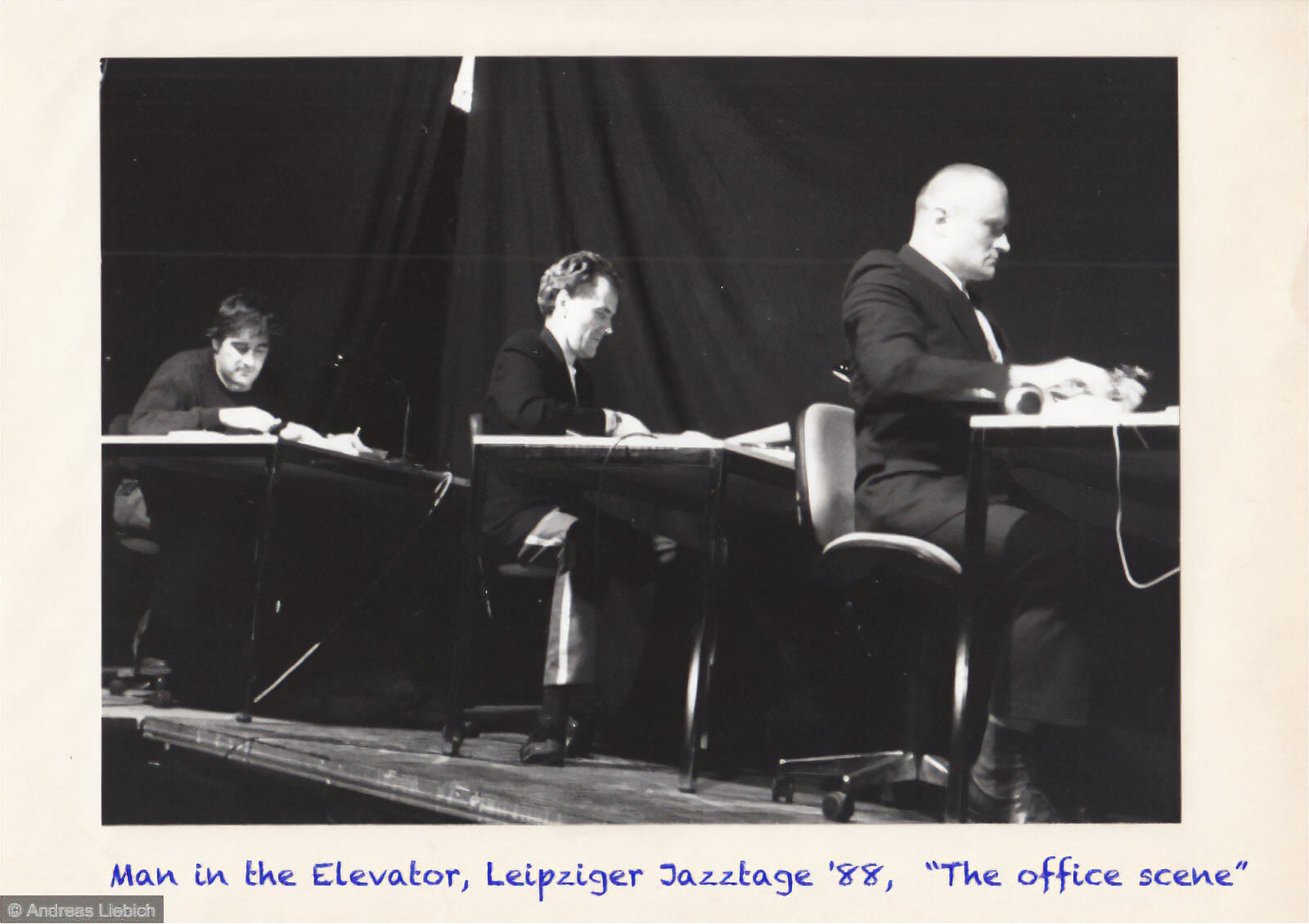Der Mann im Fahrstuhl
The Man in the elevator1987


staged concert with words by Heiner Müller
composed and directed by Heiner Goebbels
stage and light Thomas Dreissigacker
with Heiner Müller, Arto Lindsay, Fred Frith, Don Cherry, George Lewis/Johannes Bauer, Peter Hollinger/Charles Hayward, Peter Hein/Holger Hiller/Ernst Stötzner, Tim Berne/Dietmar Diesner, Heiner Goebbels
for voice, git, dr, trb, trp, sax, keyboards
premiere: Artrock Festival, Frankfurt 1987, 75'
further performances between 1987 and 1990 in Berlin, Vienna, Leipzig, Paris, Strasbourg, Bonn, Bruxelles, New York, Victoriaville (CAN), Freiburg, Frankfurt (Mousonturm) etc.
produced by artmobil, frankfurt(main)
Heiner Goebbels continues his (man)made-in-heaven collaboration with Heiner Müller in this fascinating piece of hate mail to the modern condition. Drawing on talents as diverse as Arto Lindsay, Ned Rothenberg, George Lewis, Fred Frith, and Don Cherry, it begins as it ends: in a dance of doppelgangers. Lindsay carefully plots every step of this morbid ball with his delicate guitar. He is the everyman, the proverbial drone splashing his thoughts against the sphere of his labor, rattling like the many cages of transport that carry him through life’s many turns. Like his instrumental comrades, he is constructed by his attire, tuned to the plight of interaction. Lindsay’s omnipleasant diction luxuriates in every rounded r, a tempered steel to Rothenberg’s engaging reeds, the latter a guardian angel fluttering at our backs, constantly tapping the shoulder of those of us who cannot help but ignore the gesture, we in whom ignorance is a coping mechanism.
Lindsay introduces us to the Boss, Mr. Number One whom one never addresses directly. His is a name we must forget, for behind that visage of darkness lies the agitated voice of Ernst Stötzner, who seems to channel David Moss in a constant breakdown of communicative interest. Lindsay’s protagonist responds with a kneejerk expectoration, a James Brown-like cry rendered meaningless in a muzak-infested void. Two distinct voices tainting an urban desert, whose only oasis is circumscribed by the sweeping hands of a wristwatch.
This is a life written in indecipherable shorthand, a steno bound in human skin. A dripping, Peter Greenaway-like pillow book as résumé. A ball-peen hammer ticks away against the inside plane of a metallic skull, branded by the letterhead of a company whose product is never made clear. A desktop computer whines its woebegone tale. The elevator continues to glide along the shaft of our expectations, or lack thereof, smoothed along by the grist of mysteriously absent clerks and secretaries, every coworker a follicle in the dandruff-infested scalp of society.
A flapping of the lips, as if to proclaim, “I am here.” The batting of an eyelid, as if to deny the very same. Against the sparkling passage of data, one can only run in place. A voice over the PA. The boss tops himself, spilling his brilliance across the already untended battlefield of his planner. The populace ignorant, spawning the one serial number who refuses this lot. A warped record of Brazilian love songs melts in between floors, seeping into the sewer, which carries the muck of a single workday below the feet of protesters on the street. Their appeals blend into the signage that advertises their lives.
Intimations of a faraway people and their music laced with grasses of which one can only fantasize. The fume-infested club offers no solace, and only serves to hem the cloak of anonymity, which we can never seem to shrug off. The possibility of rising to the top of the bureaucratic food chain is as vain as hoping that a parachute might spring magically from one’s back the moment he jumps from the penthouse window like so many before. Still, at the end of the day, as the varicolored air burrows like a snake into one’s open shirt, a dream of love waves as one surrenders to a different sort of imprisonment, one in which bliss is real because it is self-selected. But this love belongs in another’s arms, those of the man you’ll never be, who sings as he lives: boisterously out of tune. Cherry’s trumpet cleans the slate before filling in the chrome grille of the last car you’ll ever see. A car whose license plate reads BOSS, and whose chassis was built on the predecessors into which your body will be absorbed in preparation for your replacement.
Such are the polyglot galleries Goebbels draws out of his distinct array of inceptions and spoken words. His is a scathing and evocative exploration of the urban landscape, but one that never smacks of moral self-righteousness. Rather, it involves itself in its surroundings, drawing red threads through death, the corporate environment, and noises of progress. Goebbels joins disparate elements to unite, at one moment pounding them together like two pieces of a jigsaw puzzle that won’t quite fit, the next letting them speak to one another in agreement.
This is an altogether evocative work. Like any self-respecting postmodernists, its creators always seem to implicate themselves in the very destructions they describe. Which is perhaps why the elevator is the perfect metaphor: its verticality is counterintuitive to the horizontal passage of human traffic. In that 90-degreee intersection lies more than a geometrical relationship, but something of a defining moment, a physical decay that can be felt in the indeterminacies of music-making, in the fragility of song, and in the power of speech. (Tyran Grillo)
"Ein Angestellter ist im Fahrstuhl zu seinem Chef unterwegs, den er „Nummer Eins“ nennt. Die Fahrt von unten nach oben entwickelt sich zu einem Horrortrip, da der Angestellte pünktlich sein will, aber die genaue Etagennummer nicht kennt. Die Zeit gerät aus den Fugen, das Tempo des Fahrstuhls verselbständigt sich. Durch die neue Art mit Text und Musik umzugehen war dieses Hörspiel bahnbrechend." Hessischer Rundfunk
"Obwohl "Der Mann im Fahrstuhl" bloß in den vierten Stock wollte, bringt ihn der Lift eines New Yorker Büroturms auf einen Dorfplatz nach Peru. Diesen surrealistischen Horrortrip aus dem Leben eines kleinen Angestellten, zu Pa- pier gebracht von dem Ostberliner Dramatiker Heiner Müller, verfremdet der Frankfurter Komponist Heiner Goebbels zu einer mit grellen Kontrasten ge- spickten musikalischen Collage. Mit Sprechern von der Berliner Schaubühne und New Yorker Avantgarde-Spezialisten um die Gitarristen Arto Lindsay und Fred Frith produzierte Goebbels absurde und rasante Überblendungen von Textsplittern und melodiösen Themen.
Das Resultat ist kein betuliches Jazz & Lyrik-Programm, auch kein Rock-Thea ter. Stattdessen entsteht eine irritierende Gräuschkulisse, die den Inhalt des Textes auf recht eigenwillige Weise transportiert. Der musikalische Malstrom aus Rock und Punkt, das mächtige Dröhnen und Kreischen der zwei Gi- tarren, bringt den Alptraum des verstörten Angestellten auf den Punkt. Seit zehn Jahren arbeitet Heiner Goebbels schon in dieser Weise an provokanten Kompositionen fürs Theater, und schon öfters nach Vorlagen von Heiner Müller. Das sperrige Klangexempel "Der Mann im Fahrstuhl" ist vorerst sein aufwendigstes und radikalstes Hörstück. © Stereoplay
Texts
Hörstück "Der Mann im Fahrstuhl/The Man in the Elevator" (Article, de)
Wie "FÜNF MINUTEN" Zeit und Text zerbrechen
2009, Barbara Kordes
Worte – oft geschrien, gestammelt (Review, de)
"Der Mann im Fahrstuhl" von Heiner Goebbels und Heiner Müller im Freiburger E-Werk
25 May 1990, Udo Andris, Badische Zeitung
Fünf Minuten vor der Zeit . . . (Review, de)
"Der Mann im Fahrstuhl" von Heiner Goebbels in Mousonturm
25 May 1990, Hartwin Möhrle, Frankfurter Rundschau
Ringen um einen Standpunkt (Review, de)
"Wolokolamsker Chaussee" und "Mann im Fahrstuhl"
23 May 1990, Hanno Ehrler, Frankfurter Allgemeine Zeitung
Heiner Goebbels (Portrait, de)
Vertonte Geschichte
22 May 1990, Christine Adam, Badische Zeitung
Dealing With the Sudden Shock of Freedom (Review, en)
13 November 1989, Stephen Holden, The New York Times
Der Langstreckenläufer auf dem Weg zur Wahrheit eines Werkes (Interview, de)
02/1989, Michael Engelbrecht, Jazzthetik
Die Musik spricht (Review, de)
Heiner Goebbels und Heiner Müller: "Der Mann im Fahrstuhl"
9 December 1988, Konrad Heidkamp, Die Zeit
Mit der Zigarre im Orkan der Klänge (Review, de)
Faszinierende Liaison von Musik und Sprache
3 October 1988, o.A., Rhein-Sieg Rundschau
Heiner Müller, im Fahrstuhl (Review, fr)
2 October 1988, Antoine Wicker, Dernières Nouvelles d’Alsace
Um im Kopf des Zuhörers zu explodieren (Review, de)
Heiner Müller und Heiner Goebbels: "Der Mann im Fahrstuhl" in der Roten Fabrik.
29 September 1988, Christian Rentsch, Tages-Anzeiger
Rockriffs und Sambagesäusel (Portrait, de)
Der ehemalige Spontimusiker Heiner Goebbels hat sich auf Heiner Müller eingeschworen.
12 September 1988, Thomas Miessgang, profil
Der Mann im Fahrstuhl (Review, de)
Ein Konzert von Heiner Goebbels nach einem Text von Heiner Müller
1 September 1988, Fabrikzeitung (Rote Fabrik)
Vielleicht gibt es Mitleid in Peru (Review, de)
Das 1. Internationale Art Rock Festival in Frankfurt
19 February 1987, . Pauli und Burkhard, Communale
Im Supermarkt der 80er Jahre (Review, de)
Das 1. Internationale Art Rock Festival in Frankfurt
14 February 1987, Michael Rüsenberg, Süddeutsche Zeitung
Eine Art von Rock (Article, de)
12 February 1987, Wolfgang Sandner, Faz
Eine Art von Rock (Review, de)
Klänge auf der Kippe: Zum Festival neuer Musik in Frankfurt
12 February 1987, Faz
Im Niemandsland zwischen den Stil-Losigkeiten (Review, de)
Das Erste Internationale Art Rock Festival Frankfurt
10 February 1987, Michael Rieth, Frankfurter Rundschau
Der verdrahtete Mann (Review, de)
Was ist Art Rock?
8 February 1987, Tom R. Schulz, Die ZEIT
Past Dates
May 2003
BR 2, Radio (Germany)
May 1990
Experimenta 6
Mousonturm, Frankfurt am Main (Germany)
November 1989
New Music America 10th Annivers.
The Kitchen, New York (USA)
October 1988
Ancien Belgique, Brussels (Belgium)
Theater, Kassel (Germany)
Bonn (Germany)
September 1988
Musica Festival, Strasbourg (France)
Rote Fabrik, Zürich (Switzerland)
Messehallen, Vienna (Austria)
Tempodrom, Berlin (Germany)
Jazz Festival, Leipzig (Germany)
October 1987
Festival, Victoriaville (Canada)
February 1987
Art Rock Festival, Frankfurt am Main (Germany)
Related Works
Der Mann im Fahrstuhl
Heiner Goebbels/Heiner Müller, 1988
CD